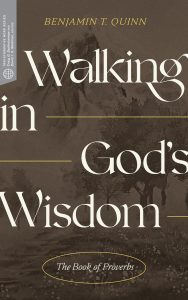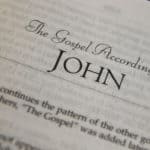
In this excerpt from Walking in God’s Wisdom, Benjamin T. Quinn lays out five essential ingredients of biblical wisdom.
One of my favorite questions to ask people is, “How would you define wisdom?” It is an interesting question as I’ve never met anyone—Christian or not—who was uninterested in wisdom. In fact, many cultures and world religions have their own wisdom traditions promoting their view of a proper way of life.
The trouble with this question, though, is that wisdom is notoriously difficult to define. Wisdom is a “totality concept” as Raymond Van Leeuwen suggests, and defining it runs the risk of leaving something out or oversimplifying. Nonetheless, we do want to be clear about our view of wisdom, so we’ll begin by offering five essential ingredients of wisdom.
Ingredient #1: Wisdom Is an Attribute of God That Is Fully Revealed in Jesus
In this book, much of our attention will focus on the aspects of wisdom that are found in creation and that are gained over time through experience and instruction. To begin, though, we must recognize that wisdom is an attribute of God; and by wisdom he created the world (Prov 3 and 8). This divine quality is mysteriously etched into God’s world, leaving traces of him in everything that has been made—both visible and invisible—and pointing all creation back to him “so that God may be all in all” (1 Cor 15:28). This is an important though delicate point; as we are not suggesting that in creating by wisdom God breached the important divide between Creator and creation. Instead, we must hold a more nuanced—even sophisticated—view of wisdom that allows us to understand it as both an attribute of God and a quality of God’s creation that directs creatures toward proper living in his world.
Ingredient #2: Wisdom Is Grounded in the Fear of the Lord
Verse 7 is the keystone of the introduction to the book of Proverbs, declaring that “the fear of the Lord is the beginning of knowledge; fools despise wisdom and instruction.” The author will bookend this first major section of Proverbs (chapters 1–9) with a nuanced but similar declaration in 9:10: “The fear of the Lord is the beginning of wisdom, and knowledge of the Holy One is insight.” Suffice it to say at this point that without the fear of Yahweh—the God of Abraham, Isaac, Jacob, Moses, David, the prophets, Jesus, and the apostles—there is no true wisdom.
Ingredient #3: Wisdom Seeks to Live According to the Order That God Has Built into Creation
Proverbs 3:19–20 alerts us to the fact that God not only built his world by wisdom, but also built wisdom into his world. There is a pattern and order to God’s world that promotes divine shalom, or flourishing, as God designed. In Genesis 3, however, sin entered the garden and wreaked havoc in God’s world. Nevertheless, we must not think that what God made good, sin made bad. Instead, sin acts as a parasite on what God has made, seeking to pervert it, corrupt it, and direct it away from God. But it cannot negate its goodness, which belongs to the Lord.
There is pattern and rhythm in creation that points creatures toward the way of the Creator. The way God built the world informs the way we ought to live. Again, this shouldn’t be confused with the ways of the world we are warned about. Instead, we recognize that the ways of the world run opposed to the way of the Lord. Those who fear the Lord are called to walk in his ways in his world, and how to do that is informed by what God has said and by what God has made.
Ingredient #4: Wisdom Focuses on Discerning God’s Ways in Particular Circumstances
If life were black and white and easy to navigate, why would we need wisdom? Knowledge alone would suffice because discernment would be unnecessary. But this is not how life works. Our human experience often leaves us facing difficult decisions about money, marriage, friendships, work, parenting, discipline, etc.—all things that Proverbs addresses. Why? Because wisdom is required.
Wisdom isn’t one-size-fits-all; instead, it is particularized to specific times and places. It considers the circumstances. Proverbs 26:4–5 illustrates this well:
Do not answer fools according to their folly,
or you will be a fool yourself.
Answer fools according to their folly,
or they will be wise in their own eyes.
Does Proverbs contradict itself here? Or might there be something in the nature of wisdom that suggests the wise response is not always the same? In one case, the fool may be teachable and willing to receive correction, so we answer him with correction. In another case, however, we may discern that the fool is not teachable. Thus, it would be foolish to waste our time offering correction. These two proverbs teach us that answering or not answering a fool requires wisdom.
This must not be understood as inconsistent, relativistic, or wisdom that is prone to favoritism. By no means! Instead, wisdom recognizes the uniqueness of specific times, places, and people and carefully applies love for God and neighbor to those circumstances.
Ingredient #5: Wisdom Is Rooted in Tradition
In the first chapter of Proverbs we read, “Hear, my child, your father’s instruction, and do not reject your mother’s teaching” (1:8). This parent-to-child, teacher-to-student voice that narrates much of Proverbs’ early chapters signals the importance of wisdom that is handed down through generations. This tradition of wisdom is set in contrast to other wisdom traditions in the ancient world because it originates with Yahweh—the God of Abraham, Isaac, Jacob, Moses, and David (and eventually, Jesus and the apostles). And it begins with a fear of Yahweh. Other wisdom traditions are oriented toward other gods, but Proverbs is oriented toward the true God—the maker of heaven and earth.
These five wisdom ingredients are not exhaustive. Yet they are central to the Bible’s teaching about wisdom, especially in Proverbs, and serve to assist Godfearers everywhere as we journey through this great book about wise living in God’s world.
This post is adapted from Walking in God’s Wisdom: The Book of Proverbs by Benjamin T. Quinn (Lexham Press, 2021).
With three new titles in the Transformative Word series out last month, we have a fantastic promotion celebrating the whole series. The more you buy, the more you save—up to 40% off!







